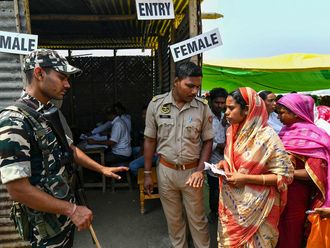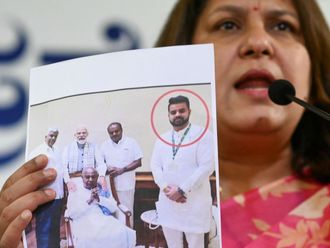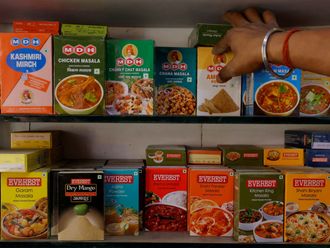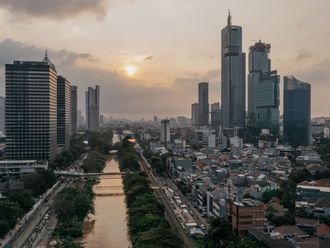_resources1_16a0851e354_medium.jpg)
The need to change the names of places has acquired an urgency in India that seems to be pointing to something more than the expediency of easy pronouniation. The Bharatiya Janata Party’s rapid exercises in providing new monickers for long-standing names, especially ahead of the 2019 General Elections are acquiring a hue that is distinctly akin to saffron, say many political observors.
Religion always in play for BJP
In 2014, when the BJP came to power riding on a tidal wave of popularity, its promised in its election manifesto to build a temple to the Hindu deity Ram in Ayodhya (which is considered to be his birthplace) within the Constitution’s framework. Since it has not been able to do so, the BJP wants to show the faithful that it is still devoted to the issue and is going on a spree to rename places which have a distinct ring of Muslim history attached to them. Example, Faizabd in the state of UIttar Pradesh that has been recently renamed Ayodhya.
According to Indian historian Professor Irfan Habib, a renowned historian, who is well known for his anti-communal views, “Except for the BJP, no other political party is involved in changing the names of places.The BJP has this Hindutva philosophy in which they assume and assert that only Hinduism is the fountainhead of the Indian culture. And therefore, if traces of Muslim influence cannot be wholly removed, they should be curtailed. Of course, they oppose Christians also, but since the Christian community is not such a prominent minority in India, the name changing only affects the Muslims,” he said.
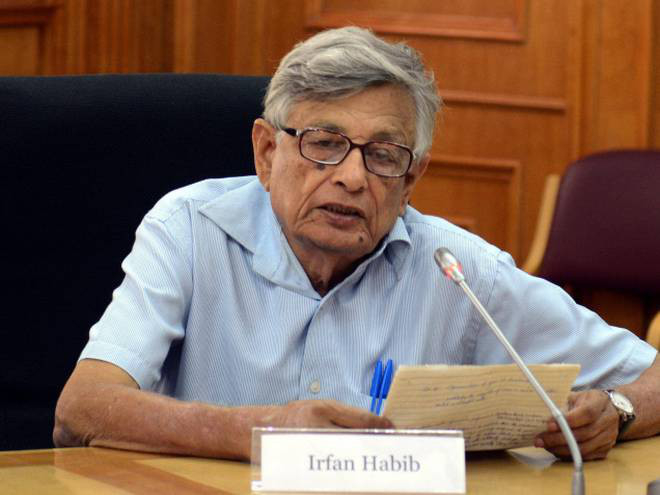
Prof Habib’s alma mater is Oxford and the Aligarh Muslim University in India. He is the recipient of the Padma Bhushan, the second highest civilian ward in India and has authored several books including volumes of People’s History of India.
But not all changing of names of places are driven by communal imperatives. A few years ago, in the Indian capitral New Delhi, the then ruling Congress party had renamed the business and financial hub known as Connaught Place and Connaught Circus - named as such by the British - to Rajiv Chowk and Indira Chowk, respectively, taking after the names of the stalwarts of the Congress family, Rajiv Gandhi and his mother Indira Gandhi. On such a move, Prof Habib said, “After Independence, several roads were renamed and the British names were removed. For instance: Janpath was known as Queen’s Way. But then, these were done under a nationalist influence and not under religious influences.”
The impetus for change, he believes, is also important to consider when assessing the nature of change.
Kolkata and Chennai
For example, the city of Calcutta became Kolkata in 2001 and Madras (the southern city which was named Madras when the British East India Company established a trading post there in 1639) to Chennai in 1996. Such changes, said Prof Habib were an altogether different matter. “In Bengali, the city’s name was always written as Kolkata and during the Mughal rule, Chennai was known as Chennapatnam; the British named it Madras.”
A shadow of doubt stalks this matter when renaming is an attempt to deny and destroy history rather than reclaim cultural moorings. The influence of periods in a country’s evolution that involve foreign invasion or rule, Habib remarked, were what were being targeted. “You cannot change history. The BJP is creating fiction in the name of history [by denying them]. After all, those events have actually taken place.”
According to Prof. Habib, revisionism is not an Indian pursuit alone. Many countries, he said, attempt to subvert the real path of historical developments.
Nothing can be achieved by distorting history, he reiterated.
As I said, you cannot change events in history; you can only misrepresent them. And that’s what is being done. We thought India had a more scientific approach to its own history. Unfortunately, that is being vitiated now.
Prof. Habib believes that history has an unalienable right to tell its story and that should not be tampered with or denied. A hundred years from now, when people talk of India’s history, and when students of history study India, such renaming episodes may well erase the true origins of places and landmarks, presenting a version of history that is doctored. But not every attempt at erasing the past works. Places would be remembered for what they were, said Prof. Habib. “The fact that Prayagraj was known as Allahabad will remain. The attitude to history and its role should be that whatever is established by evidence, we should accept it. This includes the fact that Muslims have been a part of the Indian culture just as Hindus and Sikhs have been a part of the culture of Pakistan.”
Hear it from the BJP and Congress spokespersons:":
"But those who invaded India tried to impose their culture on us."
V K Sharma, BJP, National Head, IT and Social Media
“There are reasons that have pushed the BJP to undertake the exercise of renaming places. India is known for its history, traditions and civilizations. But those who invaded India tried to impose their culture on us. No one has the right to force us to forget our culture and why should we be the slaves of the names that are not Indian?
All that the BJP is doing is to safeguard and restore the true soul of ‘Bharat’. We have renamed places because we want people to know more about our heritage. Is there a point in remembering people who invaded our country and destroyed our civilization and heritage?

Renaming cities according to India’s philosophy has always been impactful. It is an initiative to preserve our customs and ethos. For instance: Bombay was renamed Mumbai because the city boasts of the ancient temple Mumba Devi, dedicated to goddess Mumba. We believe in spirituality and that’s what the country should stand for. In fact, any party that believes in such initiatives should be lauded for such decisions.
We do not want our children to grow up in places, which fail to show the true divinity of that place. The BJP is only tracing its roots and trying to bring back the lost glory.”
"Cities should be renamed only if people of that particular place desire."
Sushmita Dev, Congress MP, Silchar, Assam
Cities should be renamed only if people of that particular place desire. But the BJP is bent upon causing a diversion in the thought process of citizens by changing names of even those places, which are not required and certainly not wanted by people residing there. There was no need to rename places, as was done in UP recently.
Name changing does not bring much to the country in any aspect. I genuinely feel that BJP is trying to create a smokescreen to divert attention from more pressing issues concerning the country, such as poverty, health and education and also, how badly the move of demonetisation of the currency failed.
“The BJP has no real answers for the people of India on the failure of the government and they do not want to accept the fact that until now they have only given false promises and betrayed people. To get away with it, they are trying to create issues that are unimportant and only spiritually or sentimentally connected to people.
There’s a need to understand that such moves serve no purpose except that they create administrative complexities and unnecessary financial burden on the exchequer.”
Indians have their say:
Firdous Azmat, associate professor, Jamia Milia Islamia, New Delhi
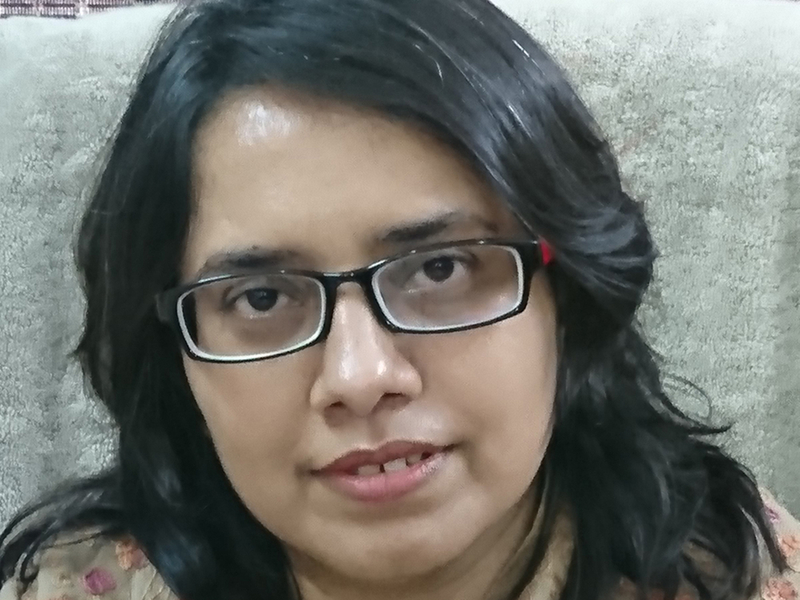
“Renaming a city will not make it a smart city. It requires tolerance and free thought to make a city modern in its outlook. It is not possible to impose ‘one country-one culture’ rule in a country like India, whose diversity is its beauty. Renaming is nothing but an effort to distort history, which is based on factual events. How can one even think of changing facts? Sadly, the dilemma of history is that no one takes lessons from it. History tells us that attempts of its distortion have often been dangerous for countries. It has only given rise to fundamentalism. My concern is also for the next generation, as to how they will learn and connect with their roots.”
Amrish Goel, entrepreneur
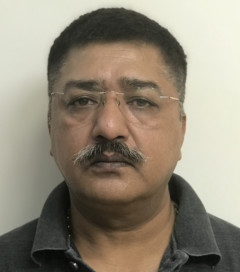
“There should be a public debate and reasons given before any move is made to rename the city or a place. And if at all, they should consider changing the name of the country – from India to ‘Bharat’ or ‘Hindustan’. The name India was given by the Britishers, so why stick to that. According to our culture and local languages, including Sanskrit and Hindi, almost everywhere the country is referred to as Bharat. The government should have the will to do that, just as Burma was renamed Myanmar. This will make sense and I am sure most Indians will approve and appreciate it. But it certainly made no sense when as chief minister of Uttar Pradesh, even the Bahujan Samaj Party chief Mayawati went on a name-changing spree in the state.”
Aftab Alam, social activist

“Renaming a city or a place is not as simple as renaming a child. It invokes mental and emotional harassment to the dwellers of that place. Born and brought up in Allahabad, I have felt proud to call myself an Allahabadi. How can I suddenly turn into a Prayagraji? The city has a history of syncretic culture and no one has the right to destroy our composite culture. Even as the place reminds us of British atrocities against our freedom fighters; it also reminds us of the old education hubs. As far as Prayag is concerned, its significance has never diminished in parallel existence of Allahabad. But renaming the city shows a tyrannical attitude towards a particular community and an effort to demolish its identity.
Sushant Hector, educationist

“The purpose should be to have an inclusive society where we can live in a peaceful and clean environment. So, the question arises: is changing the name of a city or a place serving that purpose?. Quite the contrary, as it rather ends up creating friction and division between communities. And at the same time, it distorts history, which to a student several decades from now will be very confusing. Actually, at the time of elections, political parties make tall promises and when they are unable to meet the expectations of the public, resort to such tactics that have no relevance to society at large. Can anyone explain in what way has life changed after Orissa became Odisha and Bangalore became Bengaluru?”


